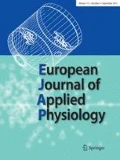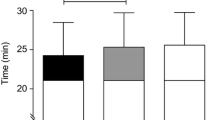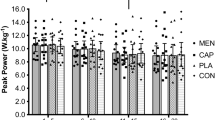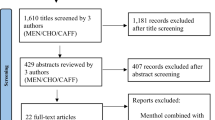Abstract
Purpose
The study investigated the effect of a non-thermal cooling agent, l-menthol, on exercise at a fixed subjective rating of perceived exertion (RPE) in a hot environment.
Method
Eight male participants completed two trials at an exercise intensity between ‘hard’ and ‘very hard’, equating to 16 on the RPE scale at ~35 °C. Participants were instructed to continually adjust their power output to maintain an RPE of 16 throughout the exercise trial, stopping once power output had fallen by 30%. In a randomized crossover design, either l-menthol or placebo mouthwash was administered prior to exercise and at 10 min intervals. Power output, \(\dot{V}\)O2, heart rate, core and skin temperature was monitored, alongside thermal sensation and thermal comfort. Isokinetic peak power sprints were conducted prior to and immediately after the fixed RPE trial.
Results
Exercise time was greater (23:23 ± 3:36 vs. 21:44 ± 2:32 min; P = 0.049) and average power output increased (173 ± 24 vs. 167 ± 24 W; P = 0.044) in the l-menthol condition. Peak isokinetic sprint power declined from pre-post trial in the l-menthol l (9.0%; P = 0.015) but not in the placebo condition (3.4%; P = 0.275). Thermal sensation was lower in the l-menthol condition (P = 0.036), despite no changes in skin or core temperature (P > 0.05).
Conclusion
These results indicate that a non-thermal cooling mouth rinse lowered thermal sensation, resulting in an elevated work rate, which extended exercise time in the heat at a fixed RPE.





Similar content being viewed by others
Abbreviations
- HR:
-
Heart rate
- Rf:
-
Respiratory frequency
- RPE:
-
Rating of perceived exertion
- TRAAK:
-
TWIK-related arachidonic acid-stimulated K+ channel
- TREK-1:
-
TWIK-related K+-1 channel
- TRPM8:
-
Transient receptor potential cation channel subfamily M member 8
- VE:
-
Minute ventilation
- \(\dot{V}\)O2 :
-
Oxygen consumption
- VT:
-
Tidal volume
- Wmax:
-
Power output at \(\dot{V}\)O2max
References
American College of Sports Medicine (2000) ACSM’s guidelines for exercise testing and prescription, 6th edn. Lippincott Williams & Wilkins, USA
Andersen HH, Olsen RV, Moller HG et al (2014) A review of topical high-concentration l-menthol as a translational model of cold allodynia and hyperalgesia. Eur J Pain 18:315–325. doi:10.1002/j.1532-2149.2013.00380.x
Armada-da-Silva PAS, Woods J, Jones DA (2004) The effect of passive heating and face cooling on perceived exertion during exercise in the heat. Eur J Appl Physiol 91:563–571. doi:10.1007/s00421-003-1006-0
Arngrïmsson S, Petitt D, Stueck M et al (2007) Cooling vest worn during active warm-up improves 5-km run performance in the heat. Am J Physiol Regul Integr Comp Physiol J Appl Physiol 292:167–175. doi:10.1152/japplphysiol.00979.2003
Baker LB, Lang JA, Larry KW (2009) Change in body mass accurately and reliably predicts change in body water after endurance exercise. Eur J Appl Physiol 105:959–967. doi:10.1007/s00421-009-0982-0
Barwood MJ, Corbett J, White D, James J (2012) Early change in thermal perception is not a driver of anticipatory exercise pacing in the heat. Br J Sports Med 46:936–942. doi:10.1136/bjsports-2011-090536
Bedford T (1936) The warmth factor in comfort at work: a physiological study of heating and ventilation. In: Industrial Health Research Board, 76th edn. HMSO, London
Borg G (1982) Psychophysical bases of perceived exertion. Med Sci Sports Exerc 14:377–381. doi:10.1249/00005768-198205000-00012
Browne S, Renfree A (2013) Exercise performance and neuromuscular activity at a fixed level of RPE following manipulation of peripheral physiological status. J Hum Sport Exerc 8:820–828. doi:10.4100/jhse.2013.83.07
Cabanac WI, Massonnet B (1972) Preferred skin temperature as a function of internal and mean skin temperature. J Appl Physiol 33:699–703
Cabanac M, Cunningham DJ, Stolwijk JAJ (1971) Thermorequlatory set point during exercise: a behavioral approach. J Comp Physiol Psychol 76:94–102. doi:10.1037/h0031050
Coelho AC, Cannon DT, Cao R et al (2015) Instantaneous quantification of skeletal muscle activation, power production, and fatigue during cycle ergometry. J Appl Physiol 118:646–654. doi:10.1152/japplphysiol.00948.2014
Cohen J (1988) Statistical power analysis for the behavioral sciences, 2nd edn. Erlbaum, Hillsdale, New York
Cordery P, Peirce N, Maughan RJ, Watson P (2016) Dopamine/noradrenaline reuptake inhibition in women improves endurance exercise performance in the heat. Scand J Med Sci Sport. doi:10.1111/sms.12753
Cotter JD, Taylor NAS (2005) The distribution of cutaneous sudomotor and alliesthesial thermosensitivity in mildly heat-stressed humans: an open-loop approach. J Physiol 565:335–345. doi:10.1113/jphysiol.2004.081562
Crewe H, Tucker R, Noakes TD (2008) The rate of increase in rating of perceived exertion predicts the duration of exercise to fatigue at a fixed power output in different environmental conditions. Eur J Appl Physiol 103:569–577. doi:10.1007/s00421-008-0741-7
Curran AK, O’Halloran KD, Bradford A (1998) Upper airway cooling reduces upper airway resistance in anaesthetized young guinea-pigs. Eur Respir J 11:1257–1262
de León-Casasola OA (2009) Pain pathways and mechanisms of neuro-pathic pain. Informed 11:369–372
de Morree HM, Klein C, Marcora SM (2012) Perception of effort reflects central motor command during movement execution. Psychophysiology 49:1242–1253. doi:10.1111/j.1469-8986.2012.01399.x
Eccles R (1994) Menthol and related cooling compounds. J Pharm Pharmacol 46:618–630. doi:10.1111/j.2042-7158.1994.tb03871.x
Flouris AD, Cheung SS (2009) Human conscious response to thermal input is adjusted to changes in mean body temperature. Br J Sports Med 43:199–203. doi:10.1136/bjsm.2007.044552
Gagge AP, Stolwijk JA, Hardy JD (1967) Comfort and thermal sensations and associated physiological responses at various ambient temperatures. Environ Res 1:1–20. doi:10.1016/0013-9351(67)90002-3
Galloway SD, Maughan RJ (1997) Effects of ambient temperature on the capacity to perform prolonged cycle exercise in man. Med Sci Sports Exerc 29:1240–1249. doi:10.1097/00005768-199709000-00018
Gillis DJ, House JR, Tipton MJ (2010) The influence of menthol on thermoregulation and perception during exercise in warm, humid conditions. Eur J Appl Physiol 110:609–618. doi:10.1007/s00421-010-1533-4
González-Alonso J, Calbet JAL (2003) Reductions in systemic and skeletal muscle blood flow and oxygen delivery limit maximal aerobic capacity in humans. Circulation 107:824–830. doi:10.1161/01.CIR.0000049746.29175.3F
González-Alonso J, Teller C, Andersen SL et al (1999) Influence of body temperature on the development of fatigue during prolonged exercise in the heat. J Appl Physiol 86:1032–1039
Green BG (1986) Menthol inhibits the perception of warmth. Physiol Behav 38:833–838. doi:10.1016/0031-9384(86)90050-8
Haggard P, de Boer L (2014) Oral somatosensory awareness. Neurosci Biobehav Rev 47:469–484. doi:10.1016/j.neubiorev.2014.09.015
Hampson DB, St Clair Gibson A, Lambert MI, Noakes TD (2001) The influence of sensory cues on the perception of exertion during exercise and central regulation of exercise performance. Sport Med 31:935–952. doi:10.2165/00007256-200131130-00004
Kounalakis SN, Botonis PG, Koskolou MD, Geladas ND (2010) The effect of menthol application to the skin on sweating rate response during exercise in swimmers and controls. Eur J Appl Physiol 109:183–189. doi:10.1007/s00421-009-1345-6
MacDougall JD, Reddan WG, Layton CR, Dempsey JA (1974) Effects of metabolic hyperthermia on performance during heavy prolonged exercise. J Appl Physiol 36:538–544
Marcora SM (2009) Perception of effort during exercise is independent of afferent feedback from skeletal muscles, heart, and lungs. J Appl Phyiology 106:2060–2062. doi:10.1152/japplphysiol.90378.2008
Marcora SM, Bosio A, de Morree HM (2008) Locomotor muscle fatigue increases cardiorespiratory responses and reduces performance during intense cycling exercise independently from metabolic stress. Am J Physiol Regul Integr Comp Physiol 294:R874–R883. doi:10.1152/ajpregu.00678.2007
Marino F, Booth J (1998) Whole body cooling by immersion in water at moderate temperatures. J Sci Med Sport 1:73–82. doi:10.1016/S1440-2440(98)80015-7
Marino FE, Mbambo Z, Kortekaas E et al (2000) Advantages of smaller body mass during distance running in warm, humid environments. Pflugers Arch Eur J Physiol 441:359–367. doi:10.1007/s004240000432
McKemy DD, Neuhausser WM, Julius D (2002) Identification of a cold receptor reveals a general role for TRP channels in thermosensation. Nature 416:52–58. doi:10.1038/nature719
Mündel T, Jones DA (2010) The effects of swilling an l(−)-menthol solution during exercise in the heat. Eur J Appl Physiol 109:59–65. doi:10.1007/s00421-009-1180-9
Nishino T, Tagaito Y, Sakurai Y (1997) Nasal inhalation of l-menthol reduces respiratory discomfort associated with loaded breathing. Am J Respir Crit Care Med 156:309–313
Noakes T (2004) Linear relationship between the perception of effort and the duration of constant load exercise that remains. J Appl Physiol 96:1571–1573. doi:10.1152/japplphysiol.01124.2003
Noble BJ, Metz KF, Pandolf KB, Cafarelli E (1973) Perceptual responses to exercise: a multiple regression study. Med Sci Sports 5:104–109
Noel J, Zimmermann K, Busserolles JJ et al (2009) The mechano-activated K+ channels TRAAK and TREK-1 control both warm and cold perception. EMBO J 28:1308–1318. doi:10.1038/emboj.2009.57
Nybo L (2008) Fatigue mechanisms determining exercise performance hyperthermia and fatigue. J Appl Physiol 104:871–878. doi:10.1152/japplphysiol.00910.2007
Nybo L, Nielsen B (2001) Perceived exertion is associated with an altered brain activity during exercise with progressive hyperthermia. J Appl Physiol J Appl Physiol Univ Wales Aberystwyth 91:2017–2023
Orani GP, Anderson JW, Sant’Ambrogio G, Sant’Ambrogio SF (1991) Upper airway cooling and l-menthol reduce ventilation in the guinea pig. J Appl Physiol 70:2080–2086
Peier AM, Moqrich A, Hergarden AC et al (2002) A TRP channel that senses cold stimuli and menthol. Cell 108:705–715. doi:10.1016/S0092-8674(02)00652-9
Peiffer JJ, Abbiss CR (2011) Influence of environmental temperature on 40 km cycling time-trial performance. Int J Sports Physiol Perform 6:208–220. doi:10.1123/ijspp.6.2.208
Pereira EJ, Sim L, Driver H et al (2013) The effect of inhaled menthol on upper airway resistance in humans: a randomized controlled crossover study. Crit Care 20:1–4. doi:10.1155/2013/383019
Poulet JFA, Hedwig B (2007) New insights into corollary discharges mediated by identified neural pathways. Trends Neurosci 30:14–21. doi:10.1016/j.tins.2006.11.005
Ramanathan NL (1964) A new weighting system for mean surface temperature of the human body. J Appl Physiol 19:531–533
Roelands B, Watson P, Cordery P et al (2012) A dopamine/noradrenaline reuptake inhibitor improves performance in the heat, but only at the maximum therapeutic dose. Scand J Med Sci Sport 22:93–98. doi:10.1111/j.1600-0838.2012.01502.x
Ross MLR, Garvican LA, Jeacocke NA et al (2011) Novel precooling strategy enhances time trial cycling in the heat. Med Sci Sports Exerc 43:123–133. doi:10.1249/MSS.0b013e3181e93210
Sant’Ambrogio FB, Anderson JW, Sant’Ambrogio G (1992) Menthol in the upper airway depresses ventilation in newborn dogs. Respir Physiol 89:299–307. doi:10.1016/0034-5687(92)90088-E
Schlader ZJ, Prange HD, Mickleborough TD, Stager JM (2009) Characteristics of the control of human thermoregulatory behavior. Physiol Behav 98:557–562. doi:10.1016/j.physbeh.2009.09.002
Schlader ZJ, Simmons SE, Stannard SR, Mündel T (2011a) Skin temperature as a thermal controller of exercise intensity. Eur J Appl Physiol 111:1631–1639. doi:10.1007/s00421-010-1791-1
Schlader ZJ, Simmons SE, Stannard SR, Mündel T (2011b) The independent roles of temperature and thermal perception in the control of human thermoregulatory behavior. Physiol Behav 103:217–224. doi:10.1016/j.physbeh.2011.02.002
Schweiker M, Fuchs X, Becker S et al (2016) Challenging the assumptions for thermal sensation scales. Build Res Inf. doi:10.1080/09613218.2016.1183185
Shirreffs SM, Maughan RJ (1998) Osmolality and conductivity as markers of hydration status. Med Sci Sports Exerc 30:1598–1602. doi:10.1097/00005768-199811000-00007
Siegel R, Maté J, Brearley MB et al (2010) Ice slurry ingestion increases core temperature capacity and running time in the heat. Med Sci Sports Exerc 42:717–725. doi:10.1249/MSS.0b013e3181bf257a
Stevens CJ, Best R (2016) Menthol: a fresh ergogenic aid for athletic performance. Sport Med. doi:10.1007/s40279-016-0652-4
Stevens CJ, Thoseby B, Sculley DV et al (2015) Running performance and thermal sensation in the heat are improved with menthol mouth rinse but not ice slurry ingestion. Scand J Med Sci Sport. doi:10.1111/sms.12555
Swart J, Lamberts RP, Lambert MI et al (2009) Exercising with reserve: evidence that the central nervous system regulates prolonged exercise performance. Br J Sports Med 43:782–788. doi:10.1136/bjsm.2008.055889
Tatterson AJ, Hahn AG, Martini DT, Febbraio MA (2000) Effects of heat stress on physiological responses and exercise performance in elite cyclists. J Sci Med Sport 3:186–193. doi:10.1016/S1440-2440(00)80080-8
The Comission for Thermal Physiology of the IUPS (2001) Glossary of terms for thermal physiology. Jpn J Physiol 51:245–280. doi:10.1016/S0306-4565(02)00055-4
Tucker R (2009) The anticipatory regulation of performance: the physiological basis for pacing strategies and the development of a perception-based model for exercise performance. Br J Sports Med 43:392–400. doi:10.1136/bjsm.2008.050799
Tucker R, Rauch L, Harley YXR, Noakes TD (2004) Impaired exercise performance in the heat is associated with an anticipatory reduction in skeletal muscle recruitment. Pflügers Arch Eur J Physiol 448:422–430. doi:10.1007/s00424-004-1267-4
Tucker R, Marle T, Lambert EV, Noakes TD (2006) The rate of heat storage mediates an anticipatory reduction in exercise intensity during cycling at a fixed rating of perceived exertion. J Physiol 574:905–915. doi:10.1113/jphysiol.2005.101733
Urbaniak GC, Plous S (2015) Research randomizer (version 4.0) (computer software)
Van Cutsem J, De Pauw K, Buyse L et al (2017) Effects of mental fatigue on endurance performance in the heat. Med Sci Sports Exerc. doi:10.1249/MSS.0000000000001263
Vanden Hoek TL, Kasza KE, Beiser DG et al (2004) Induced hypothermia by central venous infusion: saline ice slurry versus chilled saline. Crit Care Med 32:S425–S431. doi:10.1097/01.CCM.0000134259.59793.B8
Waldron M, Villerius V, Murphy A (2014) Augmenting performance feedback does not affect 4 km cycling time-trials in the heat. J Sports Sci 338:786–794. doi:10.1080/02640414.2014.962579
Watson P, Hasegawa H, Roelands B et al (2005) Acute dopamine/noradrenaline reuptake inhibition enhances human exercise performance in warm, but not temperate conditions. J Physiol 565:873–883. doi:10.1113/jphysiol.2004.079202
Zhang H, Huizenga C, Arenas E, Wang D (2004) Thermal sensation and comfort in transient non-uniform thermal environments. Eur J Appl Physiol 92:728–733. doi:10.1007/s00421-004-1137-y
Zheng X, Hasegawa H (2016) Central dopaminergic neurotransmission plays an important role in thermoregulation and performance during endurance exercise. Eur J Sport Sci 16:818–828. doi:10.1080/17461391.2015.1111938
Acknowledgements
We would like to express our gratitude to the participants who took part in the experimental study.
Author information
Authors and Affiliations
Corresponding author
Ethics declarations
Conflict of interest
The authors declare that there is no conflict of interest.
Additional information
Communicated by Narihiko Kondo.
Rights and permissions
About this article
Cite this article
Flood, T.R., Waldron, M. & Jeffries, O. Oral l-menthol reduces thermal sensation, increases work-rate and extends time to exhaustion, in the heat at a fixed rating of perceived exertion. Eur J Appl Physiol 117, 1501–1512 (2017). https://doi.org/10.1007/s00421-017-3645-6
Received:
Accepted:
Published:
Issue Date:
DOI: https://doi.org/10.1007/s00421-017-3645-6




